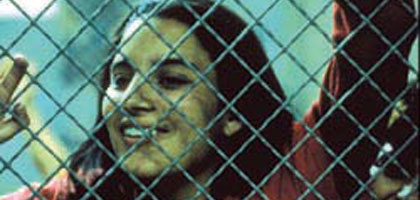
Beyond our Ken
Film of the Month: Bread and Roses

Ken Loach's latest film is his first set in Los Angeles, but this exposé of labour relations in the City of Dreams is no Hollywood sell out, argues Peter Matthews
Bread and Roses can't be called one of Ken Loach's greatest works, but the fact is that virtually no other director would think of attempting a film about the plight of non-unionised janitors in Los Angeles. While this may not sound like a terrific inducement for popcorn junkies, the keen sense of moral responsibility informing the production makes most current cinema look fatuously self-absorbed by comparison. In a career spanning more than three decades Loach has never budged from his radical principles, describing the everyday truth of the marginal with few concessions to political or aesthetic fashion. His sheer doggedness is often taken for a species of naivety - as if he were a Marxist country bumpkin whose sentimental addiction to the proletariat consigned him to the ash-heap of history. Yet in a period of stylistic ostentation, Loach's modest transparency of means is salutary.
There's something very British about a film-maker who turns parochialism into a strength, knowing his art depends for its force on a sodden familiarity with those domestic institutions (such as the social services in Ladybird Ladybird, 1994) that circumscribe the lives of ordinary people. A Loach film stakes its claim to authenticity on the concrete particulars of class, region and (to the despair of his foreign distributors) dialect - which is why the idea of him setting up shop in Hollywood has always seemed anathema.
It would be easy to blame the inadequacies of Bread and Roses on the director's rash decision to forsake his native sources of inspiration and test himself in an environment for which he was mentally unprepared. Even the most honourable film artists suffer attacks of hubris. The last time for Ken Loach was in the disconcertingly schizoid Carla's Song (1996), which connected with reality so long as it kept to the straight and narrow of the early Glaswegian scenes, but sailed off into socialist-humanist Disneyland once the action shifted to Nicaragua. There's little sense that Loach understands the LA of Bread and Roses the way he understood the northern industrial wasteland of Kes (1969) or the Manchester dole culture of Raining Stones (1993). Indeed, the City of Angels has perhaps never before come across as so inscrutably banal, textureless and lacking in visual distinction. Loach himself reportedly savours the irony of needing to dodge the manifold regulations imposed by the technical unions when shooting the film, and it's conceivable the more corporate style of American film-making pitched this indie veteran in over his head.
But if Loach feels spiritually dispossessed in Tinsel Town, then so do the Mexican illegal immigrants whose story he tells. It's here that the prosaic look of the movie betrays an ethical dimension - Loach denies us a touristic spectacle the characters themselves have scant leisure to enjoy. Instead he sticks to the immediate vicinity of the steel and glass tower where the janitors work, framing them simply in anonymous windows and corridors. It may not even matter that one can't always say where the protagonists' alienation ends and the director's begins. A supposedly comical episode in which the exploited casuals invade a swank Hollywood party with their vacuum cleaners is so poorly staged it suggests Loach has never been within miles of such an event. But the stiff, unconvincing quality of the sequence also reveals something - for it effectively denudes the show-biz types of conventional glamour and mimics their squirming embarrassment at the social contradictions staring them in the face.
Throughout there are similar small victories of transfigured awkwardness. An elderly cleaner's stricken expression when she's peremptorily fired for being late appears to spring as much from a non-professional actor's discomfort as from her character's misfortune. Yet this fleeting moment delivers the shock of reality caught red-handed - which is to say that Loach remains steadfast in his commitment to blurring the boundaries between documentary and fiction.
The film's spartan mise en scène is largely co-ordinated with the cleaners' dull blue uniforms - mustering a pictorial flourish or two only after they've switched to red Justice-for-Janitors T-shirts. One epic shot of the new militants crossing a bridge en masse evokes 20s Soviet cinema, and the steal appears deliberate. Like Land and Freedom (1995) and some earlier films Loach made for television (The Big Flame, 1969; Days of Hope, 1975), Bread and Roses comes near to realising the Eisensteinian ideal of a collective hero. Though the class struggle in this case remains on the molecular level (as in Riff-Raff, 1991), the characters are basically emblems of dissent rather than individuals in their own right. The immigrant workers sport anonymous livery, while their corporate masters are portrayed as so many headless suits and shuffling shoes.
Loach could hardly be more graphic in announcing a method based on group dialectics and social typage. There's a gestural heroine in the shape of feisty Maya (Pilar Padilla), but she's a Latin spitfire straight out of central casting whose sole narrative function is to be politicised. Loach and screenwriter Paul Laverty are so unequivocally on the janitors' side they're willing to forego a degree of moral subtlety. Time and again, one feels ambiguities have been quashed in the interest of a clear revolutionary sales pitch. For a brief season it looks as if Sam (Adrien Brody), the eager labour organiser who hazards human lives at little personal risk, will be ascribed a pair of clumping clay feet. But that would complicate Loach's proletarian hero-worship, so any lingering suspicion gets transferred on to the higher-ups (represented by one of his typically cautious and self-seeking union officials).
Just about the only time the movie plumbs murkier depths is in the emotionally overpowering scene where Maya's sister Rosa (Elpidia Carrillo) explains why she finked on the activists to management and pours forth her scalding resentment of the whole family. Suddenly you're torn apart because you recognise that everyone has their reasons. For a few precious moments, Loach achieves the same quality of naked observation he sustained in his 1998 masterpiece My Name Is Joe (and one is similarly reminded that realism can't always be distinguished from melodrama). Otherwise, Bread and Roses should do much to placate those critics who have charged the director with miserabilism - there are even dollops of sprightly ethnic music to punctuate the janitors' merrier assaults on the capitalist order. Yet an upbeat Ken Loach isn't necessarily what we want. For against the facile solutions to working-class decline proposed by the likes of Billy Elliot or The Full Monty, Loach's best work dares to speak an everlasting nay.
